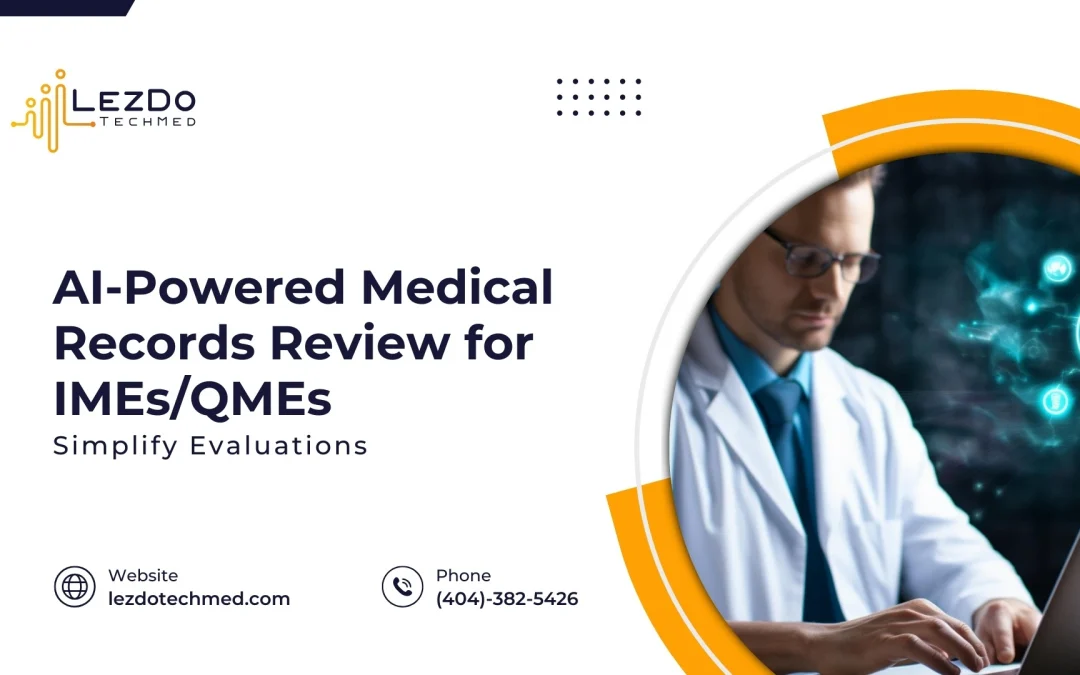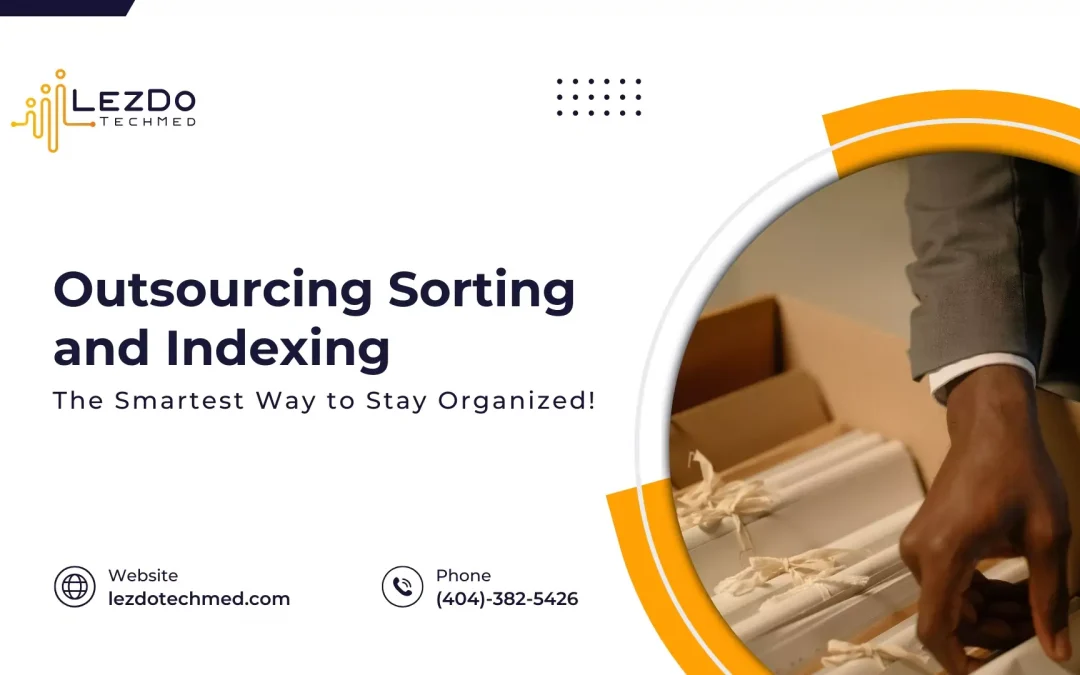Artificial Intelligence (AI) is a trending technological revolution, reshaping the entire globe in various forms. From healthcare to marketing, AI is driving the world. The truth is that the transformative AI technology is not only smoothening how we currently live and work, but is also shaping our future to the next level. AI systems are seamlessly and easily integrating into every facet of our lives.
Can AI review medical records? Yes, in this blog, we will explore how AI is revolutionizing medical record management with a keen focus on the benefits and pitfalls of AI medical record reviews. As one of the leading medical record review outsourcing firm in the U.S., LezDo TechMed has done an extensive research and comparison on AI medical record reviewing with that of the traditional record review process.
Before going deep into AI medical chart reviews, let’s delve into the mechanics of artificial intelligence in record review for your better understanding.
How does Artificial Intelligence work in medical record reviewing?
As the word indicates, artificial intelligence involves the intelligence of computer systems or technology with which it can perform tasks that otherwise requires human intelligence. The tasks artificial intelligence can perfom include learning, reasoning, problem-solving, perception, and language understanding.
Let’s now look at the fundamental AI components and processes in medical record reviews in a glance.
Machine Learning (ML)
In machine learning, computers learn from large datasets by identifying, analyzing patterns and relationships within the medical data. The Machine Learning algorithms then build models based on sample medical data to make decisions.
Neural Networks and Deep Learning
Deep learning, uses neural networks that mimic a typical human brain’s structure and function with many layers. Using the neural networks, deep learning is done, refining the model through multiple analysis.
Natural Language Processing (NLP)
NLP enables AI systems to understand, interpret, and generate human language used in medical record reviews. Major techniques in NLP include tokenization that involves breaking down text into words or sentences, parsing which is the analysis of grammatical structure and semantic analysis, the understanding of the meaning and context of words and phrases.
Computer Vision
Computer vision allows AI to interpret and make decisions based on visual medical data. The machine processes raw medical images, videos and other visual media, to extract data from them.
Data and Algorithms
Algorithms process the collected data to create models that can make decisions. Crucial types of algorithms include supervised learning, unsupervised learning, semi-supervised learning and reinforcement learning.
Understanding the basic working mechanism of Artificial Intelligence in medical record reviewing, let’s now move on to AI medical record reviews, benefits and limitations and how LezDo has streamlined it.
What is AI medical record summarization?
AI medical record reviewing and summarization is the process of analyzing healthcare records of patients for legal and insurance claims with the help of the AI. It involves all the AI techniques and processes we have mentioned above. Many AI medical record review tools are available to summarize medical charts. Using AI for medical charting makes the process easy and accurate. On the other hand, traditional medical chart reviewing involves human experts to review the patient records and prepare review reports.
Need Quality AI Medical Chart Reviews?
Advantages of AI in Medical Record reviews
Let’s now discuss the benefits of AI-powered medical chart review for lawyers, healthcare and insurance firms.
Automated Data Extraction
In AI record reviews, the Natural Language Processing (NLP) identifies and extracts all the crucial medical data from huge volumes of unstructured or wrongly organized medical records. Automated data retrieval includes important and claim-related information like physician charts, diagnostic reports, laboratory tests, treatment details, and follow-up notes.
By automating these tasks, AI eliminates the manual labor traditionally involved in human record reviewing where an expert medical record reviewer needs to go through thousands of pages of records. AI medical record reviews with automated data extraction would significantly speed up the whole review process without errors.
Enhanced Data Organization
AI systems can seamlessly organize and summarize the extracted medical data in a structured, easily navigable format. With automated processes, the AI Algorithms categorize the medical data into discrete categories such as medical history, diagnostic procedures, and billing information.
With the detailed categorization of medical data with AI, attorneys, healthcare providers and insurance firms can easily comprehend the relevant medical evidence without manually going through each record.
High Accuracy and Consistency
AI algorithms can analyze the medical records very precisely and check the vital data for accuracy and consistency. It also checks for discrepancies such as mismatched statements, missing records and gaps in medical billing. Thus AI medical record reviews help to maintain the integrity of review reports by ensuring that the information in the review reports are accurate and consistent.
Another advantage of AI in medical record review is that the tools ensure that reviews are conducted uniformly, which in the case of manual reviewing could differ between the experts. Maintaining accurate record-keeping and high-quality care depends on this standardization of AI medical record review and analysis. With this advantage, the influence of human biases and inconsistency is not in AI reviews.
Predictive Analysis
Another benefit of AI in general is that, using historical data, they can predict outcomes based on patterns they come across in similar cases. This AI feature would help to analyze and anticipate the possible progression of a claimant’s condition, treatment outcomes, and the likelihood of further complications.
For instance, in personal injury claims, involving long-term care, compensation amounts are determined based on projected future needs. In such cases, predictive analysis in AI medical record reviews would help to strengthen the lawsuits for getting the maximum compensation.
Trend Analysis
Trend analysis of AI tools can help in injury lawsuits and insurance claims where they aggregate data from different cases and identify broader trends and patterns. This feature is particularly beneficial in claims involving medical malpractice or negligence, involving discrepancies in treatment effectiveness, emerging side effects, or standards used in treatment procedures.
Trend analysis of AI in medical record reviewing can also support healthcare providers and facilities to improve patient care practices.
Scalability
The time taken by human record review experts to review and analyze thousand pages of patient records will be very high when compared to AI tools. This in turn would affect the delivery time of manual medical chart reviews. Scalability with the ability to handle huge volumes of healthcare records or the capacity to handle multiple projects at a time is possible with AI.
Even with high volume of data or records, AI systems can process and analyze data consistently without compromising quality. On the other hand, to handle multiple projects simultaneously, manual record review team should hold more number of experts.
Low Price
Companies offering AI medical chart reviews can provide services at a low pricing when compared to manual medical record reviews. This is because of the scalability advantage and less man power required. The delivery speed of the AI chart reviews is very high with which they can handle multiple clients at a time and offer services at low costs.
Integration with Other Systems
AI tools can effortlessly integrate with any healthcare management systems, such as electronic health records (EHR). This feature can streamline workflows and case management in AI medical chart reviews. This ease in integration allows for a more comprehensive analysis and understanding of a patient’s medical history and current health status, aiding in more informed decision-making in lawsuits.
Training and Improvement
Machine learning models in AI have the capability to improve over time through continuous training with new data input. As the AI tools review and analyze more and more medical records, they derive and store more information, which would help them understand complex medical terminologies, gaps in medical records etc. It would also help in dealing with patient records in motor vehicle accident lawsuits, involving accident reconstruction or biomechanics reports.
Ready to get started? Get free trial worth $500. Hurry up!
Limitations of AI Medical Chart Reviews
Having discussed the AI medical record review advantages, let’s have an elaborated understanding on the drawbacks and limitations of using AI medical record reviews which is currently faced by all the medical record review outsourcing companies.
Data Privacy and Security
Unlike human medical record reviewing, AI systems raise significant privacy and security issues while handling medical records with sensitive patient information. The AI systems if not complying with stringent regulatory requirements, such as HIPAA can pose serious data privacy concerns. Even with data regulatory precautions, the chances of data breach can happen with unauthorized access to AI systems.
Dependence on Input Data
The accuracy of AI-driven outcomes and conclusions are highly dependent on the quality of input data the AI tools process over time. Hence inconsistent or inaccurate medical data can lead to incorrect analyses and decisions by AI.
AI may not fully capture all the complications in medical records that experienced medical professionals identify in record reviews. This can lead to a compromise in the reliability of AI chart reviews, making it imperative that the review report is thoroughly audited and validated by an expert.
High Initial Costs and Maintenance
To engage AI tools in medical record review requires significant investment and set up cost. Costs include not only software development and purchase but also hardware infrastructure upgrades and training the staff to use new systems effectively.
AI systems also require continuous monitoring, maintenance, and updates to remain effective. This involves not only software updates but also retraining AI medical record review models with new data to keep them updated with evolving medical and legal standards. These expenses can be huge for small record review companies, potentially limiting the adoption of AI technology.
Legal and Ethical Implications
AI in medical record reviews can lead to complex legal and ethical issues. An AI-generated error can create bias in claims, making it challenging to determine liability. This can mess up complicated injury lawsuits or insurance claims, thereby affecting even the credibility of the record review company.
Technological Limitations
Medical records can contain complex intricacies and information that AI algorithms may struggle to comprehend. Handwritten notes, medical phrases, and abbreviations can be especially difficult for AI to understand accurately, which could result in inaccurate interpretations and data extractions.
To overcome the limitations of AI medical chart reviews and explore its potential to the core demands extensive streamlining and customization processes. At the same time, the expertise of a medical record review expert should be there to finetune and audit the AI record review process. Medical record review companies that can blend both these can stand out by providing precise and quality AI medical chart reviews.











